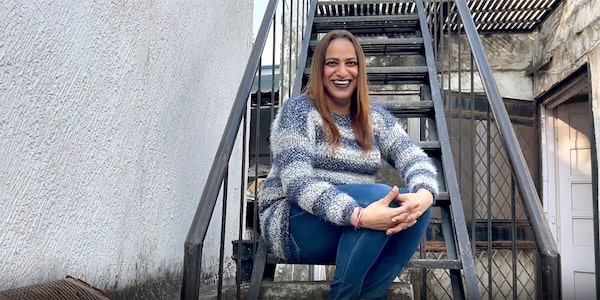
Sirat Taneja, subject and co-creator of Deepa Mehta's new documentary I Am Sirat, in an undated handout photo.HO/The Canadian Press
Sirat Taneja had never travelled outside of New Delhi, never mind embarking on a more than 18-hour transatlantic journey. It was nerve-racking to walk through the gleaming Indira Gandhi International Airport, relying on advice from strangers, in order to attend the Toronto International Film Festival last year. Throughout the flight she was scared of falling mid-air. But she kept thinking of her mentor, Deepa Mehta, and her dreams of visiting Canada.
She was also excited, calling her family and friends to share her experiences once she landed.
“This is what the inside of a plane looks like. This is how they serve the food. This is what you get to eat in the plane,” says Taneja, 35, speaking in Hindi and giggling throughout her descriptions of documenting her trip.
For someone so enthusiastic about sharing her life experiences, for a long time Taneja felt unable to show her true self to those closest to her. She’s been living a double life for decades: as a loving son at home, and as a gregarious woman outside.
In a way, Taneja’s identity is an open secret. Since she presents as female on her Instagram account, there is a general awareness of her queer identity in her immediate circles. However, some people – including her mother – choose to ignore it. Others, such as her colleagues at the government organization she works at, don’t understand it completely, but are accepting. Strangers sometimes consider her an object of ridicule, “but I fully ignore them,” Taneja says.
An entertainer at heart, Taneja never considered herself an actor. But when an audition for a small role as a prison guard in Deepa Mehta’s Netflix series Leila came up, she took a chance. When she met Mehta on the New Delhi sets, she was immediately drawn to the renowned filmmaker. They became close after a weeklong workshop that Mehta conducted for the actors, and stayed in touch even after shooting concluded.
“I used to go to Deepa Ma with all sorts of problems,” says Taneja, using her affectionate nickname for the director. “And she used to tell me, ‘You should do this. You shouldn’t do that.’ She was like a mother to me.”
During one of these rant sessions, Taneja joked that her colourful life is a subject worthy of a film. Thinking it through further, she later asked Mehta whether she would seriously consider making the documentary. It could be a way for Taneja to finally tell her story to the world, and especially her mother.
Mehta, surprised by the request, took some time to mull the idea over. The film needed to be from Taneja’s perspective, and she was trying to figure out how to centre that narrative, the director says.
She felt comfortable taking on the project once she figured out a way for Taneja to be in control of her own story. She felt a warmth toward her new friend, who had charmed her way into Mehta’s life with her naÏveté and openness.
“She’s just so honest about what she doesn’t know. She had no clue about acting, and she did not pretend that she knew. She was not a very good actor, but she became one. And now she’s going to work in other movies, which I am thrilled about,” says Mehta, referring to offers that Taneja has received from other Indian directors.
Before embarking on shooting, Mehta asked Taneja to write down her story – whatever she wanted to show the world.
“I told her to write how she would like it to start, and how it would end. There was no concept of an arc because it didn’t mean anything to someone who’s not from the industry. But, ‘What’s my story?’ – she got that. She started with her home,” Mehta says.
The film alternates between selfie-style videos shot by Taneja – getting ready for work, interacting with her mother, hanging out with friends – and those by Mehta, in which she asks Taneja to think through aspects of her identity. There was no film crew. Taneja shot her videos in portrait mode while Mehta captured Taneja and her surroundings in landscape mode.
It was a process of discovery for both. Although Taneja was used to creating fun content for her Instagram feed, she started thinking about the ways she wanted to present herself in a film. For Mehta, it was a lesson in patience: Accustomed to calling the shots, she found herself taking cues from Taneja.
“I learnt that I could be directed,” says Mehta, breaking into her signature gravelly laugh. “Who knew, at this age, I would get to learn that? And I have Sirat to thank for it.”
After screening I Am Sirat at TIFF, Taneja has taken the film to festivals in London and Dharamshala and received positive feedback from audience members. She’s now looking forward to showcasing the film at festivals in Chandigarh and New Delhi, where she will also be able to invite her friends and family members.
“I am really excited about that. And a little nervous,” Taneja says. The film may finally offer an opportunity to present her daily quandary of living a double life to her loved ones.
“It’s still like a weight on me, every time I have to pretend at home. Sometimes, I speak in a female voice at home by mistake. I have to remember to modulate my voice. It can be very exhausting,” she says.
As far as future projects are concerned, Taneja has started to think of a sequel: a film about life after her coming gender reassignment surgery.
“I haven’t spoken to Deepa Ma about it yet. First I need to achieve all my dreams with this film,” she says, bursting into laughter.
I Am Sirat streams on CBC Gem starting March 3.
Special to The Globe and Mail
 Aparita Bhandari
Aparita Bhandari